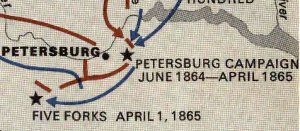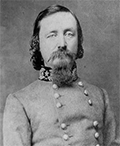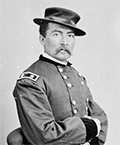The Battle of Five Forks
The Battle of Five Forks, on April 1, 1865, was one of the last battles of the American Civil War. In March 1865, Union troops ringed the vital railroad junction at Petersburg and had done so for several months, having also cut off nearly all 
Pickett had three cavalry divisions of his own, along with one division of infantry. The place he was told go to, Five Forks, was southwest of Petersburg, at the junction of the Dinwiddie Court House Road, Ford's Road, Scott's Road, and White Oak Road. Pickett and Sheridan had already fought twice the day before, in the vicinity of Dinwiddie Court House, without either side scoring a victory. Pickett's orders were to hold Five Forks "at all hazards." Pickett got word of the approach of Union troops early on April 1 and ordered his troops to hunker down in a strong defensive position. The troops doing the defending numbered 9,200. Advancing on their position were nearly twice that many men, 17,000, a mix of cavalry under Sheridan and infantry under Maj. Gen. Gouverneur Warren. Because of a series of misadventures–including making sense of maps that weren't entirely accurate and making slow progress on muddy roads–Sheridan and Warren and their men arrived at Forks in mid-afternoon and were not really in position to advance an attack until 4 p.m. Sheridan, angry at the delay, ordered an attack that initially caught the Confederate defenders off-guard, in the sense that their commanding officers were nowhere to be found. Pickett and cavalry commander Maj. Gen. W.H.F. Lee had gone off to lunch several miles away and had not informed their subordinates of their intended absence. They did not hear the beginning of the battle and arrived long after they could have been effective. Those in charge further down the chain of command figured out well enough that they need to stop the Union advance, and they did so for a time. However, a timely Union cavalry charge broke through the Confederate and forced the defenders to |
|
Social Studies for Kids
copyright 2002–2026
David White



 supply lines for the Confederate troops who, despite having being extensive fortifications and
supply lines for the Confederate troops who, despite having being extensive fortifications and  command of
command of  regroup. Union infantry closed in, even as Sheridan's cavalry rounded the right flank, and the rout was on. Pickett and Lee were nowhere to be found, and the Union won the battle, even though their casualty totals were higher (803 Union dead or injured, 604 Confederate dead or injured). The Confederate retreat, coupled with the Union's capture of 2,400, resulted in a clear Union victory. The subsequent seizure of the Southside Railroad convinced Lee, his last supply line cut, to quit Petersburg. The very next day, top Union commander
regroup. Union infantry closed in, even as Sheridan's cavalry rounded the right flank, and the rout was on. Pickett and Lee were nowhere to be found, and the Union won the battle, even though their casualty totals were higher (803 Union dead or injured, 604 Confederate dead or injured). The Confederate retreat, coupled with the Union's capture of 2,400, resulted in a clear Union victory. The subsequent seizure of the Southside Railroad convinced Lee, his last supply line cut, to quit Petersburg. The very next day, top Union commander 
